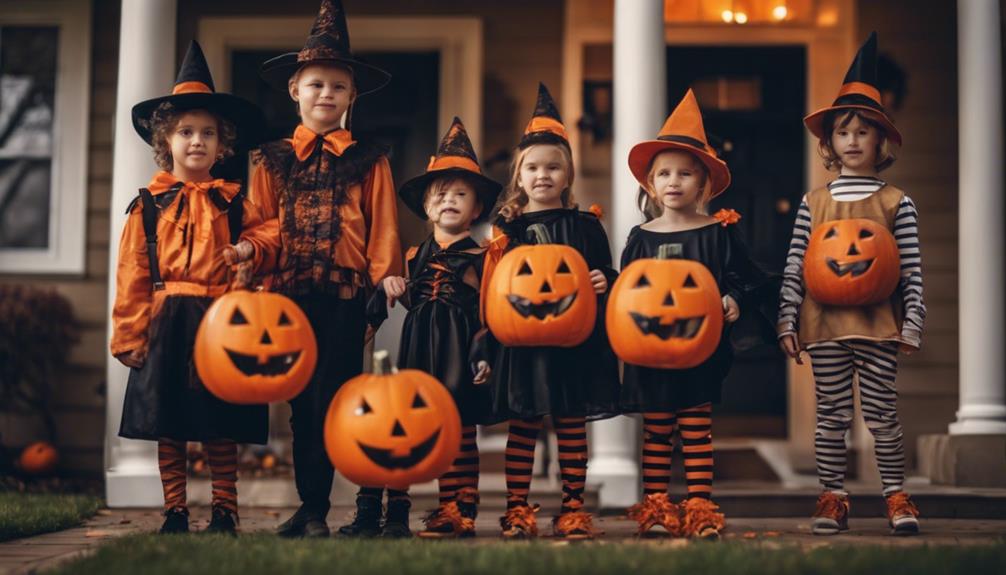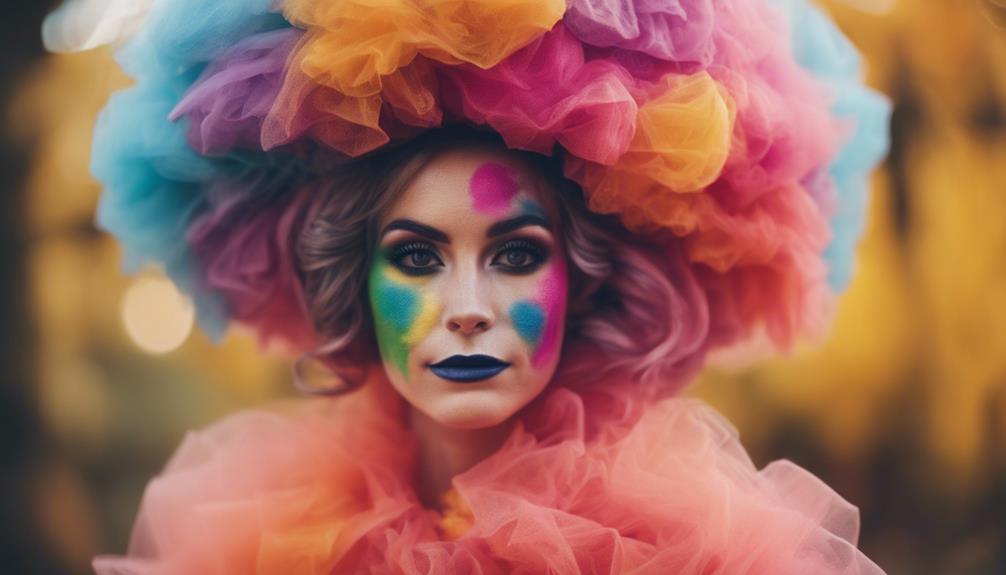Halloween could conflict with biblical teachings due to its roots in pagan practices involving sorcery and darkness. Verses like Deuteronomy 18:10-12 and Ephesians 5:7-15 caution against such activities. Participating in Halloween customs with occult elements may go against the Bible's stance on witchcraft and sorcery. Christian perspectives on Halloween vary, from avoidance to moderation, guided by personal convictions and biblical principles. Christian values like discernment and avoiding darkness are key when considering Halloween celebrations. Exploring the Bible's teachings further on this topic can provide insightful perspectives.
Key Takeaways
- Halloween contradicts biblical teachings on witchcraft and sorcery.
- Pagan rituals in Halloween are explicitly condemned in the Bible.
- Scriptures warn against activities like divination and consulting spirits.
- Participating in Halloween customs with occult elements goes against biblical prohibitions.
- Christians should align Halloween choices with faith convictions and biblical principles.
Biblical Perspective on Halloween
When exploring the biblical viewpoint on Halloween, it's important to take into account the guidance provided in Scripture regarding engaging with pagan practices. The Bible doesn't specifically mention Halloween, but it does address the broader issue of pagan practices.
In Deuteronomy 18:10-12, there are clear prohibitions against activities like sorcery and divination, which are often associated with Halloween traditions. New Testament teachings encourage believers to live in the light and distance themselves from darkness, which can be relevant when considering Halloween themes.
Ephesians 5:7-15 specifically instructs Christians to expose and avoid unfruitful works of darkness, which aligns with the need for discernment in participating in Halloween activities. Christians should prayerfully consider how their involvement in Halloween aligns with biblical principles and whether it glorifies God.
It's essential for believers to evaluate their choices regarding Halloween in light of their faith convictions and the Biblical teachings on engaging with pagan practices and avoiding unfruitful works of darkness.
Scriptural Warnings Against Halloween

Taking into account the clear warnings in Scripture against practices associated with Halloween, it's evident that engaging in such activities goes against Biblical teachings. Here are some key points to ponder:
- Deuteronomy 18:10-12 condemns practices like witchcraft and sorcery, which are often associated with Halloween.
- 2 Chronicles 33:6 highlights the evil of soothsaying and witchcraft, cautioning against engaging in such activities.
- Leviticus 20:6 warns against consulting mediums and spirits, aligning with the caution against occult practices.
- Revelation 21:8 includes sorcerers among those facing judgment, emphasizing the seriousness of involvement in such practices.
- The Bible doesn't mention Halloween directly but provides clear warnings against activities commonly associated with the holiday.
Halloween Practices and Biblical Prohibitions
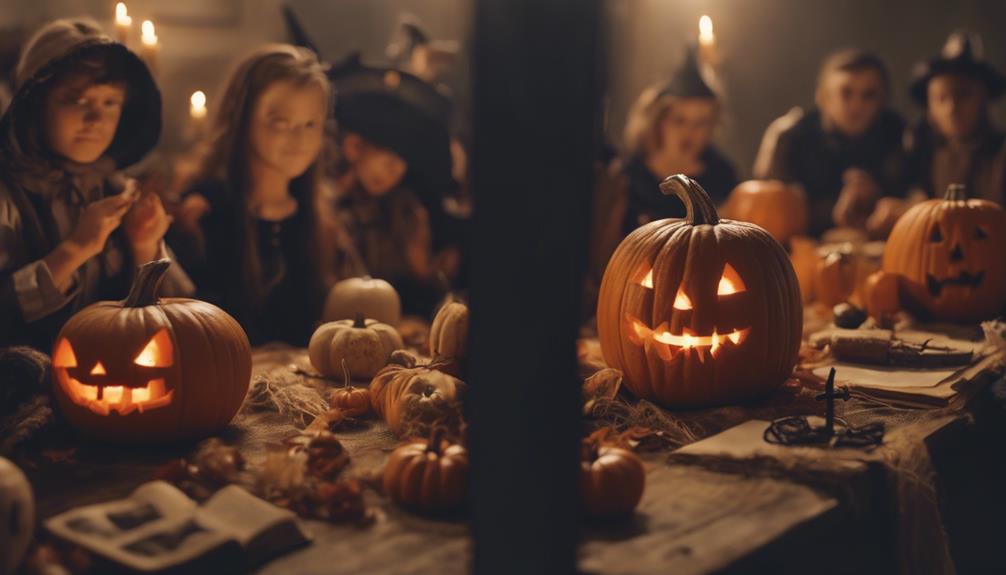
Engaging in Halloween practices contradicts biblical teachings due to the clear prohibitions against witchcraft, sorcery, and divination found in key passages like Deuteronomy 18:10-12 and Leviticus 20:6. The Bible explicitly condemns these pagan rituals and occult activities, which are often associated with Halloween festivities.
For instance, 2 Chronicles 33:6 emphasizes the evil nature of soothsaying and witchcraft, aligning with the biblical stance against such practices. Leviticus 20:6 further prohibits consulting mediums and spirits, themes commonly found in Halloween folklore and traditions.
Revelation 21:8 even includes sorcerers among those who'll face judgment, underscoring the seriousness of engaging in occult practices like those intertwined with Halloween celebrations. By participating in Halloween customs that involve witchcraft, sorcery, and divination, you're going against the explicit warnings and prohibitions laid out in the Bible regarding these practices.
It's crucial to contemplate the biblical perspective on such matters and make informed choices aligning with your faith.
Relevance of Bible Verses to Halloween
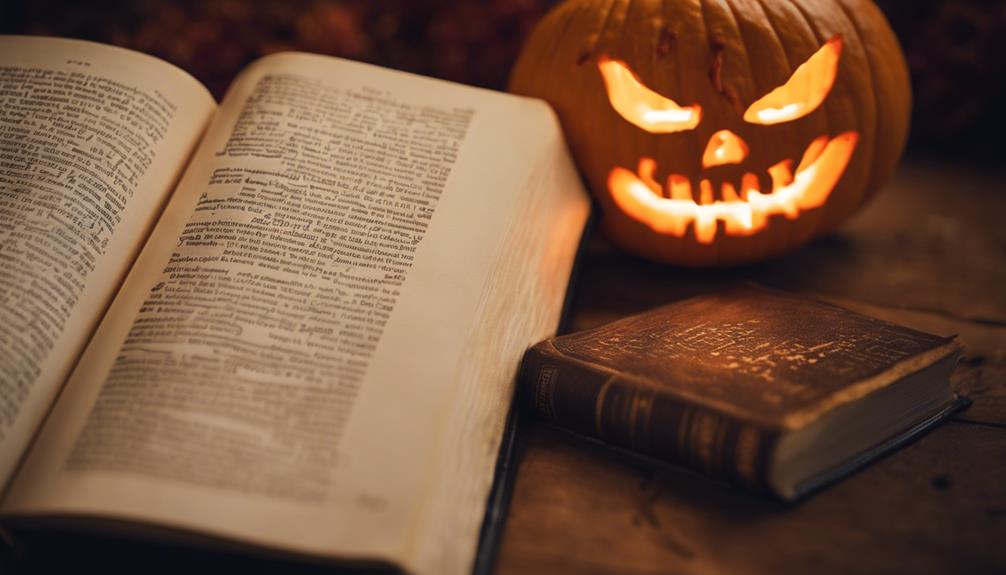
The biblical verses cited underscore the conflict between Halloween practices and Christian beliefs, shedding light on the relevance of scripture to the observance of this holiday. Here's a breakdown of what the Bible says that resonates with concerns about Halloween:
- 1 Corinthians 10:21 warns against participating in both the Lord's table and demonic practices, touching on Halloween themes.
- Ephesians 5:11 advises against engaging in unfruitful works of darkness, aligning with concerns about Halloween activities.
- 1 Peter 5:8 urges vigilance against the devil's schemes, reflecting on the caution needed during Halloween celebrations.
- Romans 13:12 encourages casting off darkness and embracing light, emphasizing the contrast between Halloween's dark themes and Christian values.
- James 4:7 emphasizes resisting the devil and submitting to God, guiding Christians in their choices regarding Halloween participation.
These verses provide guidance for Christians grappling with the tension between Halloween festivities and their faith.
Christian Stance on Celebrating Halloween
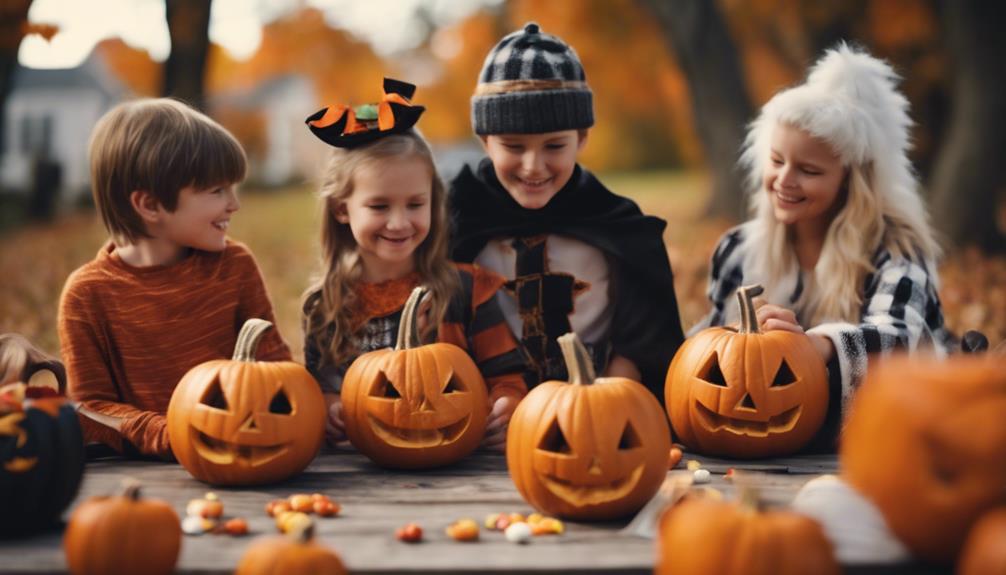
When examining the Christian stance on celebrating Halloween, believers often grapple with conflicting viewpoints within their faith community. Some Christians view Halloween as a celebration intertwined with evil spirits and practices that contradict Biblical principles of avoiding darkness. On the other hand, there are those who perceive Halloween as a harmless cultural event that can be enjoyed with discernment and moderation.
Christian perspectives on Halloween vary widely, ranging from complete avoidance to active participation with a focus on representing Christ in a secular context. Scripture serves as a guide for Christians maneuvering the decision of whether to celebrate Halloween, emphasizing the importance of reflecting godly values and steering clear of unfruitful works of darkness.
In response to differing views, some churches offer alternative events like Harvest Parties as a positive and safe environment for celebrating without the associations of Halloween. Ultimately, each believer must prayerfully consider their stance on Halloween in light of their faith and personal convictions.
Frequently Asked Questions
Is It Okay for Christians to Celebrate Halloween?
If you're wondering about celebrating Halloween as a Christian, it's a topic that stirs diverse opinions. Some believe it conflicts with biblical teachings while others see it as harmless fun if approached with discernment.
Your decision as a Christian may involve considering the holiday's origins, your personal convictions, and how it aligns with your faith. Ultimately, whether to participate in Halloween is a matter of individual faith, guided by biblical principles and personal conviction.
Is It Against the Bible to Dress up for Halloween?
When deciding to dress up for Halloween, consider personal beliefs and values. Your choice should reflect your faith and principles.
The Bible doesn't explicitly mention Halloween costumes, so it's about aligning your actions with your convictions. Dressing up can be a way to have fun while staying true to your Christian beliefs.
Make sure your costume choice is respectful and in line with your faith.
What Does Halloween Mean in Christianity?
In Christianity, Halloween signifies the eve before All Saints Day, a time to honor saints and martyrs. The term 'Halloween' derives from 'All Hallows Eve,' closely linked to the Christian celebration. Since the 4th century, Christians have commemorated All Saints Day.
Although Halloween traditions have Christian origins, they've also absorbed influences from diverse cultural practices. For some Christians, Halloween offers a chance to contemplate concepts of light, darkness, and spiritual insight within their faith.
What Does the Hallows Eve Mean in the Bible?
In the Bible, All Hallows Eve refers to the evening before All Saints Day, a Christian celebration honoring saints and martyrs. The term 'Hallows' derives from Old English, meaning holy or sanctified, highlighting the sacred nature of this observance.
Understanding the significance of All Hallows Eve provides insight into its connection to Christian traditions of honoring saints and preparing for important religious occasions. This biblical concept underscores the spiritual reverence associated with saints and the Christian faith.
Conclusion
To sum up, while some may argue that Halloween goes against the Bible, it ultimately comes down to personal beliefs and convictions.
It's important to carefully consider the origins and practices of Halloween in light of biblical teachings, and make an informed decision on whether or not to participate.
Remember, it's always wise to seek guidance from trusted spiritual leaders and prayerfully consider how to approach this holiday in a way that aligns with your faith.
Choose wisely, stay true to your beliefs, and let your faith guide your choices.
